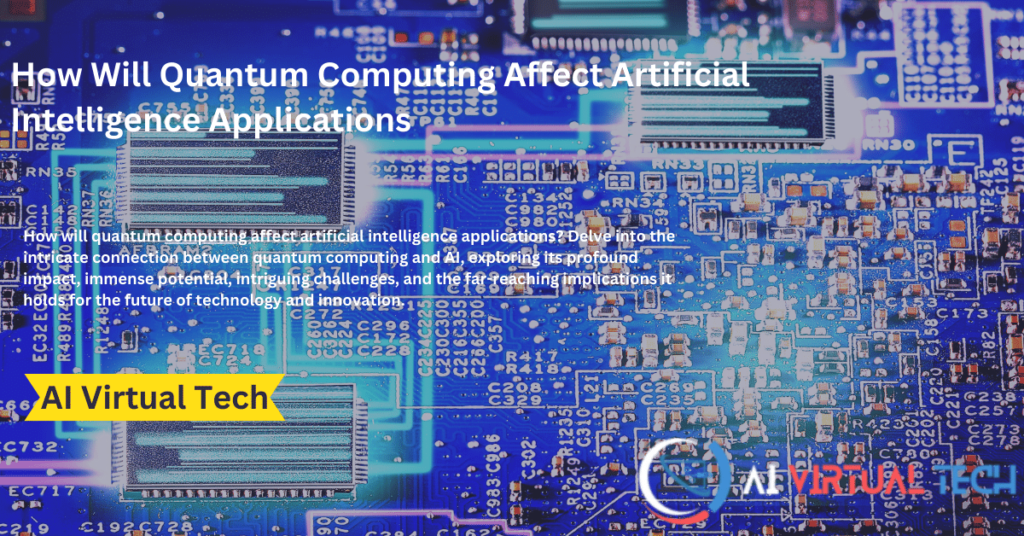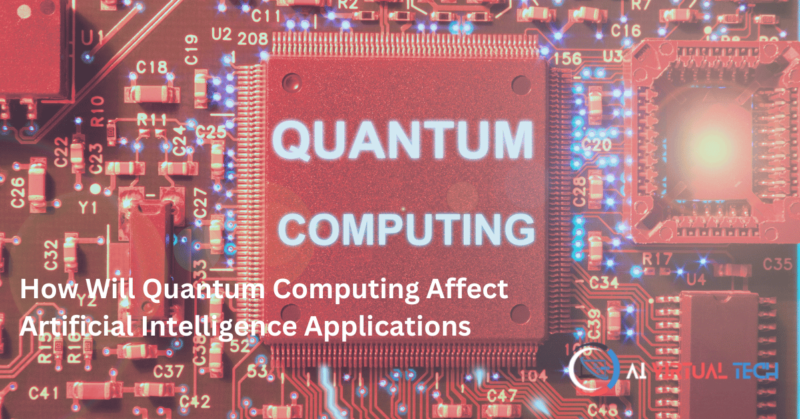How will quantum computing affect artificial intelligence applications? Delve into the intricate connection between quantum computing and AI, exploring its profound impact, immense potential, intriguing challenges, and the far-reaching implications it holds for the future of technology and innovation. Discover the fascinating interplay between these two cutting-edge fields and unlock new frontiers of computational possibilities.
Quantum Computing: A Game Changer for AI
- Quantum computing is set to bring transformative changes to artificial intelligence applications.
- Unlike traditional computing systems, quantum computers leverage the principles of quantum mechanics to process data.
- This approach not only enhances computational speed but also facilitates more complex calculations, thereby enhancing Artificial Intelligence algorithms’ efficiency.
- A crucial aspect of Artificial Intelligence applications is their capacity to learn and adapt. Quantum computing has shown a potential to accelerate machine learning, a concept integral to AI.
- By running complex models and algorithms faster, quantum systems may enable Artificial Intelligence to learn and adapt rapidly.
- However, the merger of quantum computing with Artificial Intelligence is not without challenges. Data security represents a significant concern, as quantum systems could potentially break many existing encryption methods. Hence, establishing secure frameworks for AI applications in quantum computing remains a priority.
Implications of Quantum Computing on AI’s Future
The integration of quantum computing into Artificial Intelligence applications can significantly influence their future development.
Quantum systems’ processing power can help Artificial Intelligence applications explore uncharted territories, handle more complex datasets, and provide more accurate predictions.
However, the potential of quantum computing also comes with the challenge of the unknown. The technology is still in its nascent stage, making it difficult to predict its exact impact on Artificial Intelligence applications. Researchers are striving to understand and control this new computing paradigm better.
While there are significant challenges to overcome, the promise of quantum computing is too great to ignore. Its potential to revolutionize Artificial Intelligence applications is enormous, but it will require substantial investment and development to fully realize its benefits.
Quantum and AI: Partners in Transformation
- Quantum computing and AI form a powerful synergy. The former provides the computing power needed to run complex Artificial Intelligence algorithms, while the latter gives meaning to the vast amount of data quantum computers can process.
- In the scenario of quantum supremacy, Artificial Intelligence will be an integral constituent. Quantum computers can unlock new potentials for AI, including more significant predictive capabilities and faster data processing. However, harnessing these potentials requires overcoming technical and theoretical hurdles.
- The question of how quantum computing will affect artificial intelligence applications is complex and multi-dimensional.
- Both technologies hold transformative potential, and their intersection could change the landscape of computing and Artificial Intelligence as we know it. However, the journey to this future is fraught with challenges and uncertainties, requiring a concerted effort from researchers, developers, and policymakers worldwide.
- As we navigate this uncharted territory, one thing is certain: quantum and AI are partners in transformation, and their collaboration will shape the future of technology in ways we cannot yet imagine. So, it is crucial to continue exploring and investing in both fields to fully realize their potential impact.
The Promise of Quantum Computing in AI
Quantum computing, with its distinct capabilities, presents new and exciting opportunities for AI. Unlike classical computers, which use bits to process data, quantum computers leverage quantum bits or “qubits.”
This unique computational approach allows for the processing of vast amounts of data simultaneously, which can enhance AI’s capabilities substantially.
In the realm of machine learning, for instance, quantum computers could expedite training processes and enable the handling of larger, more complex datasets.
This potential for accelerated learning and intricate problem-solving could redefine the bounds of machine learning, opening avenues for innovation.
Moreover, quantum computing could significantly enhance AI’s predictive capabilities. By processing extensive datasets simultaneously, quantum systems could identify patterns and make predictions with unprecedented speed and accuracy.
This could revolutionize sectors like finance, healthcare, and climate modeling where precise predictions are paramount.
Challenge of Quantum Computing in AI
- Despite the promise of quantum computing, implementing it in Artificial Intelligence is not without challenges. Quantum computers are still in their infancy, and the technology is not yet robust enough for widespread use.
- The creation and maintenance of qubits, which operate in highly specific, controlled conditions, is a significant hurdle.
- Additionally, quantum computing requires unique algorithmic approaches. Existing Artificial Intelligence algorithms, designed for classical computing paradigms, may not function effectively on quantum systems. This calls for the development of new algorithms and strategies to harness the power of quantum computing for AI.
- Furthermore, there are considerable ethical and security considerations. The power of quantum computing could be exploited for malicious purposes if not properly regulated.
- Balancing the potential benefits with these risks is a critical area of focus as we move towards a quantum-AI future.

The Impact of AI on Quantum Computing
While quantum computing can enhance AI, the converse is also true. AI technologies can contribute to advancements in quantum computing.
Machine learning algorithms can be used to optimize quantum computing operations, manage errors, and even design new quantum systems.
Machine learning’s ability to learn from and adapt to data can help address one of the key challenges in quantum computing: error management.
Quantum systems are highly sensitive, and even minor disruptions can cause errors. AI can help predict and mitigate these errors, improving the reliability of quantum computations.
Moreover, AI can assist in the design and optimization of new quantum systems. Machine learning algorithms can help predict the behavior of quantum systems, facilitating their design and operation. This symbiotic relationship between AI and quantum computing is set to drive advancements in both fields.
The Future: Quantum-AI Synergy
The synergy between quantum computing and AI presents a transformative potential that is only beginning to be understood.
As quantum technology advances and becomes more accessible, its integration with AI will likely become increasingly streamlined.
This partnership could lead to breakthroughs in numerous sectors. From healthcare, where quantum-AI could enable personalized medicine based on an individual’s genetic makeup, to climate science, where it could help model complex climate systems and predict changes with unprecedented accuracy, the possibilities are vast.
However, realizing this potential will necessitate substantial investment in research and development, as well as thoughtful regulation and policy-making to ensure the ethical and secure use of these technologies.
The journey to a quantum-AI future may be challenging, but the potential benefits could be transformative.
Summary
In summary, the integration of AI and quantum computing has the potential to revolutionize numerous industries and fields. With AI’s ability to enhance error management and system design, and quantum computing’s unprecedented processing power, together they can drive advancements in everything from healthcare to climate science.
Frequently Asked Questions
What is the relationship between AI and Quantum Computing?
The relationship between AI and quantum computing is symbiotic. AI can leverage quantum computing’s superior processing power for complex calculations and predictions. Simultaneously, quantum computing can use AI’s machine learning algorithms to enhance system design and error management.
How can Quantum-AI synergy impact healthcare?
The Quantum-AI synergy could make personalized medicine a reality. It could allow healthcare providers to develop treatment plans based on an individual’s unique genetic makeup, potentially improving treatment success rates and patient outcomes.
What potential does Quantum-AI synergy have in climate science?
Quantum-AI could significantly advance climate science by modeling complex climate systems and predicting changes with unprecedented accuracy. This could help in developing more effective climate change mitigation and adaptation strategies.
What does the future hold for Quantum-AI synergy?
The future of Quantum-AI synergy is promising but will require significant investment in research and development. Ethical regulations and policies to ensure the secure use of these technologies will also be necessary.
What is necessary for realizing the full potential of Quantum-AI synergy?
To realize the full potential of Quantum-AI synergy, we need substantial investment in research and development, along with thoughtful regulation and policy-making. This will ensure not only the technological advancements but also the ethical and secure use of these technologies.
Conclusion
The combination of quantum computing and AI has the potential to revolutionize various industries, from healthcare to climate science. Their synergy can enhance complex calculations and predictions while also enabling personalized solutions for individuals. However, realizing the full potential of this technology will require significant investment and responsible regulation.













